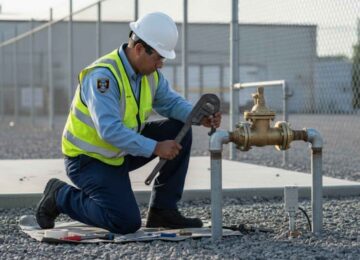When your water heater starts showing warning signs, it’s more than an inconvenience; it’s a signal that signs of a failing something deeper is wrong. A failing system can lead to water damage, mold growth, or even a flooded basement if not handled promptly. For homeowners in Fairfield County, CT, and Westchester County, NY, understanding the signs of water heater failure helps prevent unexpected breakdowns and high energy bills.
At All State Plumbing Pros, our licensed plumbers specialize in diagnosing and repairing water heater issues for both residential and commercial properties. Whether you need a new water heater, a new energy-efficient water heater, tankless water heater installation, or emergency repair, our team is available 24/7 to restore reliable hot water and peace of mind.
Why Water Heaters Fail
Even the best water heater tank can’t last forever. Over time, sediment buildup, corrosion, and worn heating elements are the most common causes of water heater failure. Minerals from hard water collect inside the tank, forming a sediment layer that reduces heating efficiency. This buildup forces your electric water heater or gas unit to use more energy to reach the same water temperature, increasing your monthly utility costs.
In areas with hard water, such as many parts of Connecticut, mineral deposits accelerate corrosion and reduce the system’s lifespan. As the anode rod deteriorates, corrosive elements begin eating away at the metal tank, eventually causing leaks or internal rusting.
| Cause | Common Result | Prevention |
|---|---|---|
| Sediment buildup | Strange noises, reduced heat efficiency | Annual tank flushing |
| Rust and corrosion | Discolored water, leaks | Replace the anode rod every 3–5 years |
| Faulty heating elements | Lukewarm water, inconsistent heating | Annual inspection by a plumber |
The best way to prevent a failing water heater is through regular maintenance, checking the pressure relief valve, draining the tank, and replacing worn components before they cause damage.
10 Common Signs of Water Heater Failure
Catching early symptoms of a failing water heater, which is a common sign, helps prevent costly repairs and sudden loss of hot water. Below are the top indicators your system might be reaching the end of its life.
1. Rumbling or Popping Noises
When your hot water tank starts making noise, it’s usually due to sediment accumulation. As water gets trapped under hardened sediment, it turns to steam and produces a rumbling or popping sound. This pressure stresses the tank, causing cracks or leaks.
Regularly flushing your water heater tank can remove sediment, improve heating efficiency, and prevent long-term damage.
2. Rusty or Discolored Water
Seeing rusty water or orange-tinted hot water, including rust spots, means corrosion is occurring inside your water tank. The anode rod, which attracts corrosive elements, might be worn out. When this rod fails, the rust starts eating away at the tank itself.
If your water quality changes suddenly, contact All State Plumbing Pros to inspect the tank and replace the anode rod through our Water Heater Repair & Installation service.
3. Leaking Around the Tank
Small leaks around the water heater often indicate loose connections, faulty valves, or cracks caused by internal corrosion. Even minor leaks can lead to serious water damage or mold. If the leak is near the pressure relief valve, it could be releasing excess pressure, a sign that the system isn’t venting properly.
If you notice leaks or moisture pooling around your water heater tank, shut off the power and water supply and call our licensed plumbing professionals for emergency service in CT and NY.
4. Inconsistent or Lukewarm Water Temperature
When you experience inconsistent water temperature, it’s often due to failing heating elements, strange noises, a malfunctioning thermostat, or a gas valve issue. These parts affect how efficiently your water heater maintains a steady temperature.
In some cases, fluctuating water temperatures can also mean that sediment has coated the heating element, preventing it from heating water evenly.
If you’re frequently running out of hot water or only getting lukewarm water, it’s time for professional maintenance or repair.
5. Reduced Hot Water Pressure or Flow
A sudden drop in water pressure from your hot water taps is often linked to sediment accumulation or mineral buildup in your inlet or outlet pipes. This buildup restricts water flow and strains your entire plumbing system.
Homeowners in Ridgefield, Danbury, and surrounding Connecticut areas often experience this issue due to hard water. A professional water heater flush and pipe inspection can restore proper water pressure and extend your heater’s life.
6. Strange Odors or Metallic Taste
A foul odor or metallic taste in your hot water usually signals bacterial growth or mineral deposits inside the tank. These issues can affect both your water quality and the tank’s structural integrity.
Installing a water softener or regularly flushing your water heater can prevent mineral buildup and keep your system functioning correctly.
7. Rising Energy Bills
An unexplained spike in your energy bills may indicate that your water heater is using less energy more power to heat through sediment buildup. When heating elements are coated with minerals, they require more electricity or gas to achieve the desired temperature.
Upgrading to a new energy-efficient water heater can help lower your energy costs and improve heating efficiency in the long run.
8. Visible Rust or Corrosion on the Tank
Rust spots or discoloration on the outside of your water heater tank often suggest internal corrosion. As the tank’s structure weakens, small leaks can develop, eventually leading to complete failure.
If corrosion is widespread, it’s safer to invest in a new water heater than risk a burst tank and a flooded basement.
9. Frequent Repairs or Pilot Light Issues
Constant repairs or recurring pilot light problems are clear indicators that your water heater is past its prime. Older units tend to lose efficiency and require more frequent service.
Instead of continuing to pay for short-term fixes, consider scheduling a consultation with our Emergency Plumbing team to discuss replacement options. We can help you determine whether repair or replacement makes the most financial sense.
10. Age Over 10–12 Years
Most tank-style water heaters last around 8–12 years with regular maintenance. Once your unit passes this range, internal components like the anode rod and heating elements begin to deteriorate, leading to leaks, reduced performance, and inconsistent hot water.
If your water heater is over 10 years old, especially in areas with hard water, start planning to replace your water heater before you experience a complete failure.
Warning Signs in Tankless and Commercial Systems
Tankless water heaters and commercial units display different warning signs than traditional systems. For tankless models, the most common issues include poor water flow, error codes, and fluctuating water temperatures during high demand. These problems often occur when mineral deposits clog the heat exchanger.
For commercial systems, failure symptoms can include inconsistent heating, low water pressure, or malfunctioning recirculation pumps. High-capacity systems in hotels or restaurants around Westchester County should be inspected twice a year to maintain water quality and prevent downtime.
Our expert technicians are trained to service both residential and commercial systems across Connecticut and New York.
When to Repair vs. Replace Your Water Heater
Knowing whether to repair or replace a failing water heater depends on age, damage level, and efficiency. Minor issues like loose connections, leaky valves, or a bad thermostat can often be repaired. However, corrosion, cracked tanks, or repeated breakdowns usually warrant replacement.
| Condition | Repair | Replacement |
|---|---|---|
| Minor leak or loose valve | ✔️ | |
| Rusty water, internal corrosion | ✔️ | |
| Over 10 years old | ✔️ | |
| Sediment buildup | ✔️ | |
| Inconsistent temperature | ✔️ |
If repairs are frequent or costly, installing a new water heater with better energy efficiency can reduce long-term expenses and improve reliability.
Preventing Water Heater Failure
The easiest way to avoid water heater failure is through routine maintenance. Simple annual checks can keep your water heater operating efficiently and prevent mineral buildup or pressure issues.
Here’s a quick maintenance checklist:
- Drain and flush your water heater tank annually to remove sediment.
- Test the pressure relief valve to ensure proper operation.
- Inspect the anode rod every 3–5 years and replace it if heavily corroded.
- Insulate your hot water pipes and tank to minimize heat loss and save energy.
Preventive maintenance also improves water quality, reduces energy consumption, and extends the life of your water heater unit.
Schedule routine inspections with our experts at All State Plumbing Pros to ensure your system stays safe and efficient year-round.
Conclusion
Recognizing the early signs of water heater failure can save you from costly repairs, unexpected breakdowns, and potential water damage. From strange noises and rusty water to fluctuating temperatures and rising energy bills, these indicators suggest it’s time to inspect your system. Addressing minor problems quickly not only improves efficiency but also extends the lifespan of your water heater, ensuring consistent hot water and better energy savings year-round.
If your water heater is leaking, making strange noises, or struggling to provide consistent hot water, don’t wait for a full breakdown. At All State Plumbing Pros, our licensed plumbers are available 24/7 for homeowners and businesses across Connecticut and New York. From emergency water heater repair and maintenance to complete replacements, contact us today for fast, dependable service that keeps your hot water running safely and efficiently.
FAQs
How do I know if I have a bad water heater?
A bad water heater often shows fluctuating water temperatures, odd noises, or discolored water. You might also notice a drop in water pressure or leaks near the base of the tank. If your unit is over 10 years old or produces lukewarm water, it’s time to call a plumbing professional for an inspection.
What is the most common cause of water heater failure?
The most common cause is sediment buildup. Minerals in the water supply settle at the bottom of the tank, creating a barrier that prevents even heating. This leads to decreased efficiency, higher energy bills, and premature wear. Regular flushing helps remove sediment and maintain proper operation.
What happens before a hot water heater goes out?
Before an electric water heater fails completely, you may hear unusual noises, see rusty water, or experience inadequate hot water. These are early warnings that the tank or internal components are deteriorating. Acting quickly can help you avoid total failure and costly repairs.
How do I know if my water heater needs to be drained?
If your hot water takes longer to heat, makes rumbling sounds, or produces discolored water, your tank likely has sediment buildup. Draining and flushing once a year helps prevent this issue and keeps your heater running efficiently.
Residents in Fairfield County and Westchester County can schedule a professional flush with All State Plumbing Pros.

![10 Warning Signs of Water Heater Failure (CT and NY Guide) When your water heater starts showing warning signs, it’s more than an inconvenience; it’s a signal that signs of a failing something deeper is wrong. A failing system can lead to water damage, mold growth, or even a flooded basement if not handled promptly. For homeowners in Fairfield County, CT, and Westchester County, NY, understanding […]](https://allstateplumbingct.com/wp-content/uploads/2025/11/signs-of-water-heater-failure-750x420.jpg)



Leave a Reply